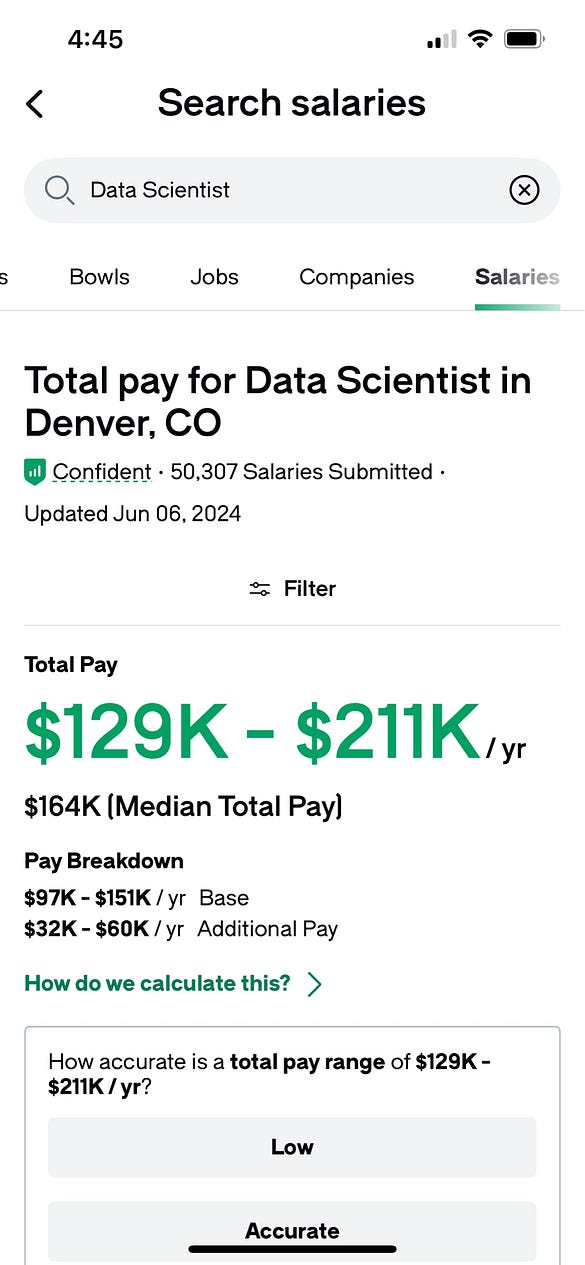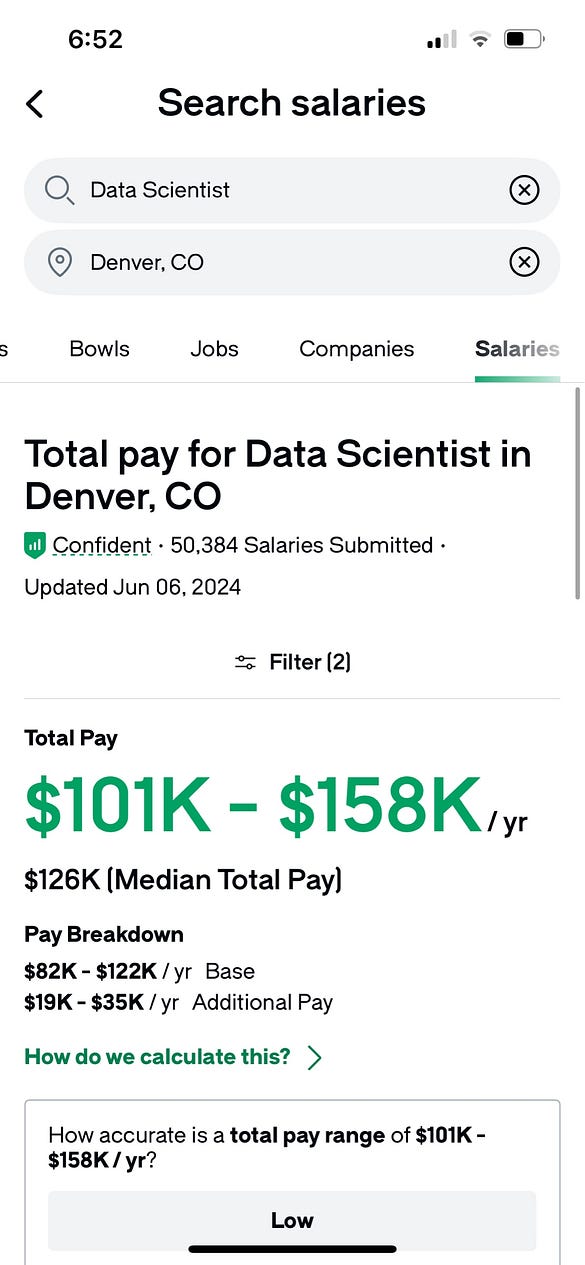How to Negotiate Your Salary as a Data Scientist
And how much I made my first year

Congratulations, you have landed a data science position!
You open your offer letter and …
Well, you’re a bit disappointed.
This is completely normal, at least for most companies, and especially if you are a junior or just starting out in the field. The data science dream you’re sold (at least in the US) includes a six figure salary straight out of college with no experience and often times the reality can be quite different.
What determines a salary
Salaries for any position are mainly determined by a few factors, some of which are out of your control:
- The company itself
- Geographical region (country, state, city)
- Your level of experience
- Your education level (Bachelors, Masters, PhD)
- Current market conditions
Other things that might factor into your salary (although probably on a smaller level) are certain skills or certifications that you possess. Depending on how relevant these skills are to the position, they could give you the upper hand when it comes to negotiations.
Understanding your market value
The whole point of salary negotiation is to ensure that you are being compensated fairly and in accordance with how much someone with your skill and experience level should be making.
The best way to measure this is by seeing what other data scientists in similar positions and in similar geographies are making.
To do this, you should do market research. You can use websites like Glassdoor, LinkedIn, or Indeed. I like Glassdoor because you can search based on a variety of factors, including years of experience.

Above is an example of what I’d search for in Glassdoor to get started if I was looking for data science positions in Denver, CO.
Up top, you can see that this estimation is based off a data set of over 50,000 salaries, submitted by real data scientists working in the area. Because of this large sample size, Glassdoor has high confidence in their estimate.
But don’t get too excited yet.
After adding 2 filters the numbers do change a bit. I filtered for 0–1 years of experience and for industry I selected Energy, Mining & Utilities since that’s the field I’ve worked in.

There’s a couple things to note here too if you aren’t familiar.
Base pay is likely the first number you’ll see when you open your offer letter. It’s the biggest chunk of what your total yearly earnings will ultimately be.
Additional pay is things like yearly bonuses, company stock shares, or sign-on bonuses. These may not be as clear on your initial letter. For example, at my first job everyone got a 10% yearly bonus as long as the company did well.
Both types of pay are typically negotiable, so it’s important that you are fully aware of what you’re being offered.
It’s also important to remember that although I filtered by industry, pay still varies a lot from company to company.
On Glassdoor, you can scroll down and see salary averages and medians by company. Of course, these most likely have less data than the overall data science dataset so you can’t be as confident in the ranges there.
The good news is that even if the specific company you’re getting an offer from’s salaries tend to be lower, you can always choose to go to another company, or use data from other higher paying companies to push that company to give you a better offer.
Building your case
Compare the number in your offer letter to your market value. Is it in range? If yes, is it in the bottom of the range, the top, or the middle?
If it’s in the bottom or middle, you want to try to push it as close to the top of the range as you can. If your offer was in the bottom of the range, you will most likely be able to negotiate up to the middle, but you should still try to (at least initially) shoot for the top.
If your offer is at the top of the range, that’s great! You should still try to negotiate more if you can.
If your offer isn’t in range at all, you definitely need to push to at least get to the low end of an appropriate range. That, or consider looking elsewhere.
I recommend creating a Word or Google document outlining your case, and that contains multiple sources — Glassdoor, Indeed, LinkedIn, and so on.
Calculate your own averages and medians based on these sites, as well as the lower and upper bounds of what’s generally deemed acceptable.
You can use this to your advantage when negotiating your salary because you can show that across multiple sites, each of which have thousands of reported salaries, your market value is crystal clear.
When negotiating, you should also think about the skills you bring that make you extra valuable to that company. These could be:
- Technical skills, such as knowing an extra programming language(s), having more extensive experience in additional data science adjacent fields such as machine learning engineering, data visualization, or data engineering
- Educational skills, such as a Master’s degree or online certifications
- Domain skills such as experience working in the particular domain that the company operates in (eg energy, healthcare, food, etc)
- Company skills such as prior experience working or interning for that company, even if it was in a different position or department
- People & communication skills, such as being in prior leadership positions, or a proven record of being a good presenter, writer, or communicator (eg If you’ve written a lot of popular Medium articles or given Ted Talks)
Discuss these skills with the person you are negotiating with and describe how and why they would make you worth hiring on a higher salary for.
Speak clearly and confidently, and don’t be afraid to push back if the employer expresses hesitations or makes excuses as to why they cannot pay you more. Be respectful, but assertively push for what you need and deserve.
How much I made my first year
Initial offer
I got my first data science offer in 2022. I won’t say what company I worked for but the company was located in a big city that pays generally well for data scientists. However, based on the research I did at the time, this company’s data science salaries trended lower than the averages for the area.
As a junior/associate data scientist, I was initially offered $75,000/year with a 10% yearly bonus ($7500) making a total salary of $82,500.
Final offer
I was ultimately able to negotiate up to a base salary of $80,000 with a $8,000/yr bonus giving me a total starting salary of $88,000.
Though 2022 was only a couple years ago, salaries do change drastically from year to year. I imagine that juniors nowadays are getting offered more than this.
Conclusion
I wanted to be transparent about how much I made my first year because sometimes there is the misconception that you will always make 6 figures right out of college, and there may be some embarrassment in not achieving that.
It really differs company to company and region to region. Speaking to other juniors and associates in my company at the time and to other classmates allowed me to feel more normal about it.
Being nervous to negotiate your salary is completely normal, especially if it’s your first time doing so.
Focus on your strengths, speak confidently, and have realistic expectations. And remember that in the end you always have the final decision and final say. If you don’t feel that the company is valuing you enough through their salary offer, don’t be afraid to walk away!
I wish you all the best of luck at your negotiations.
Thanks for reading
How to Negotiate Your Salary as a Data Scientist was originally published in Towards Data Science on Medium, where people are continuing the conversation by highlighting and responding to this story.
from Datascience in Towards Data Science on Medium https://ift.tt/NJBLv8T
via IFTTT



